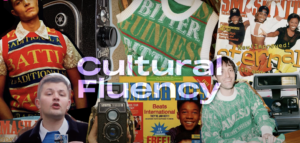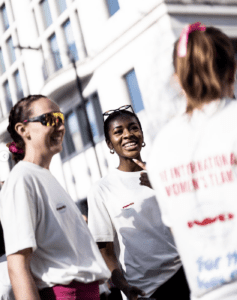Kate Blackwell is an Account Executive for THE FIFTH and was diagnosed with ADHD last year. Here, she shares her experiences of getting diagnosed, why her diagnosis was important to her, and whether it’s a positive thing that social media is leading more people to be diagnosed with ADHD.
(5 minute read. Anywhere between 5 minutes and 5 days if you have ADHD)
With over 25.3 billion searches on TikTok, the hashtag #ADHD has taken over my FYP the last few years.
It started with creators sharing their personal experience of living with attention deficit hyperactivity disorder (ADHD) in a bid to connect with a community. Now, there are a multitude of videos on various platforms that start with ‘5 signs you have ADHD’, with the leading symptom being: ‘you get bored of boring tasks’.
I’m being hyperbolic here, but despite social media being a wonderful tool to spread awareness and access new information, it’s also important that we understand the risk of passively consuming and further spreading misinformation – especially when it comes to our health and wellbeing.
@thefifthagency When you self diagnose yourself with ADHD after scrolling TikTok. Read our piece on #ADHD on our website👩🏼💻#adhdtiktok #adhdtok #mentalhealth #officetok ♬ and i.. wait a second – Liam Miller
There has been a consistent increase in assessments and diagnosis, with some assessments for ADHD taking longer than five years. Although it’s only natural that with access to new information comes an increase in diagnosis for any condition, the cause for concern comes from the dramatically high volumes of new cases which could lead to misdiagnosis or over diagnosis due to a stretch of resources, with some trusts and private practises having to ‘shut waiting lists because of demand.’
Due to increased interest in the subject, the BBC’s Panorama aired a documentary investigating ADHD assessments in private clinics across the UK, ‘exposing’ three separate private clinics after wrongly diagnosing the reporter Rory Carson.
Just a week prior, Channel 4 released a documentary also looking at ADHD diagnosis,’ but this time through the lens of reality star and content creator Sam Thompson. The programme took us along on Sam’s journey that ultimately led to him being diagnosed with not only ADHD but also with autism and a tic.
The BBC documentary sparked controversy on social media, in the papers and even from official ADHD non-profit organisations expressing their disappointment. Comments included how the documentary was ‘misleading and damaging’ in its investigation and has led to further stigma of the disability. Some took to social media expressing the gaslighting and invalidation they have recently experienced since the show aired.
@dralexgeorge An ADHD diagnosis from a private clinic is INVALID? Or is it? Have you watched the recent BBC Panorama documentary? If you are struggling with symptoms of ADHD, don’t let this stop you from seeking support 💙 #mentalhealthmatters #mentalhealthawareness #adhd #adhdtiktok ♬ original sound – Dr Alex
Having been diagnosed with ADHD myself in the spring of 2022, it’s a subject I am interested in researching. I am also keen to understand the new phenomena that is ADHD content plaguing social media and the real life effects this has.
ADHD on Social Media
Since my diagnosis, I have never been happier.
Before, I simply thought I was stupid. No matter what I did or how hard I tried, I just couldn’t do what everyone else seemed to do so easily, whether that be in educational or social settings.
This made me feel the need to constantly try and prove myself, which manifested in taking on too many projects and eventually burnout – which is very common in people with ADHD.
When I downloaded TikTok back in 2021, I was served some ADHD sketches. They were mostly quite generic and made me think ‘haha, I do that’ (that’s a reference for all my Vine lovers out there), but also made me think: doesn’t everybody regularly forget their keys?
The more I interacted with the content, the more specific and nuanced the videos became.
I began to consider I had ADHD through TikTok, and so I researched it extensively. It was important to me because if it wasn’t ADHD then what was it? I didn’t want a diagnosis for something I didn’t have, as that’s no more helpful than not having one at all.
Eventually, I’d had enough of basic and likely inaccurate free online tests and booked an appointment with my GP. The entire process took a month and I came out with the comfort that I was in fact not stupid, just different.
I owe that to social media.
@tahlsyywalsyy some signs you have may adhd, always check with a professional aswell #adhdinwomen #adhdtiktok #adhdtiktok #adhdsigns #adhdsignsinwomen #adhdsymptoms #womenadhd #adhdcheck #adhdawareness #adhdc #understandingadhd #attentiondeficienthyperactivitydisorder #neurodivergent ♬ This Is The Life – Sped Up Version – Amy Macdonald & Speed Radio
I owe it to the people who took the time to explain, in detail, the genuine limitations that having ADHD can cause. It had never, and would never, have crossed my mind to even look into it.
There is a wonderful online community where you can learn about yourself and others through social media.
Like a lot of things though, social media also has its downfalls. With an increased and over-saturated focus on ADHD, we are seeing videos spreading information that, while may not be totally inaccurate, is downplaying symptoms of ADHD and reducing the criteria of a diagnosis to common and highly relatable experiences for anyone with or without ADHD.
This further adds to the existing stigma around the disability and to people being invalidated and possibly misdiagnosed.
Not in all cases of course, but there is a danger that people are convincing themselves and often self diagnosing themselves with ADHD purely because of the content they’re seeing on social media.
In comment sections you’ll typically see an abundance of comments to the effect of ‘I couldn’t even concentrate on this whole video lol’, or ‘my doctor told me I didn’t have ADHD when clearly I do’.
Ultimately, we’re relying on the responsibility of creators to share accurate and contextual information. There is however also a responsibility yourself to actively research serious topics of all kinds that might have a real life consequence.
The NHS is seeing an increasing strain on its resources due to a sudden surge of assessments, which can lead to people sitting on waiting lists for several years who really need the help.
If you think you have ADHD
Firstly, there are a few common myths around ADHD to debunk. Here are a few of my favourites:
- You can develop ADHD.
This isn’t true. Symptoms of ADHD are present in childhood and continue into adulthood. Sometimes symptoms of ADHD are easier to spot in adulthood due to the lack of routine typically found in educational environments.
- Boys are more likely to have ADHD than girls.
This myth is likely down to the fact that girls and women are better at ‘masking’ their symptoms, coupled with the idea that ADHD is attributed to naughty little boys who couldn’t sit still in class. This lack of understanding can lead to many girls and women never being diagnosed.
- You can’t have ADHD if you have been successful.
Of course you can achieve great things, including obtaining a degree, a masters, PHD or any kind of job if you have a disability.
For more information, visit https://www.adhdfoundation.org.uk/resources/ where they offer an abundance of information and advice for finding support.
Creators to follow
Social media can be a wonderful and free way to access new information in a bite size, fun and more attainable way. Find below a few select content creators who talk about ADHD and who I would recommend giving a follow:
- Ellie Midds is the founder of the online community for neurodivergent individuals called (un)masked: Linkedin & Instagram
- Robyn Clarke
- How to ADHD (Jessica Mcgabe)
- ADHD Love (Roxy & Rick)
- Dr Alex George






